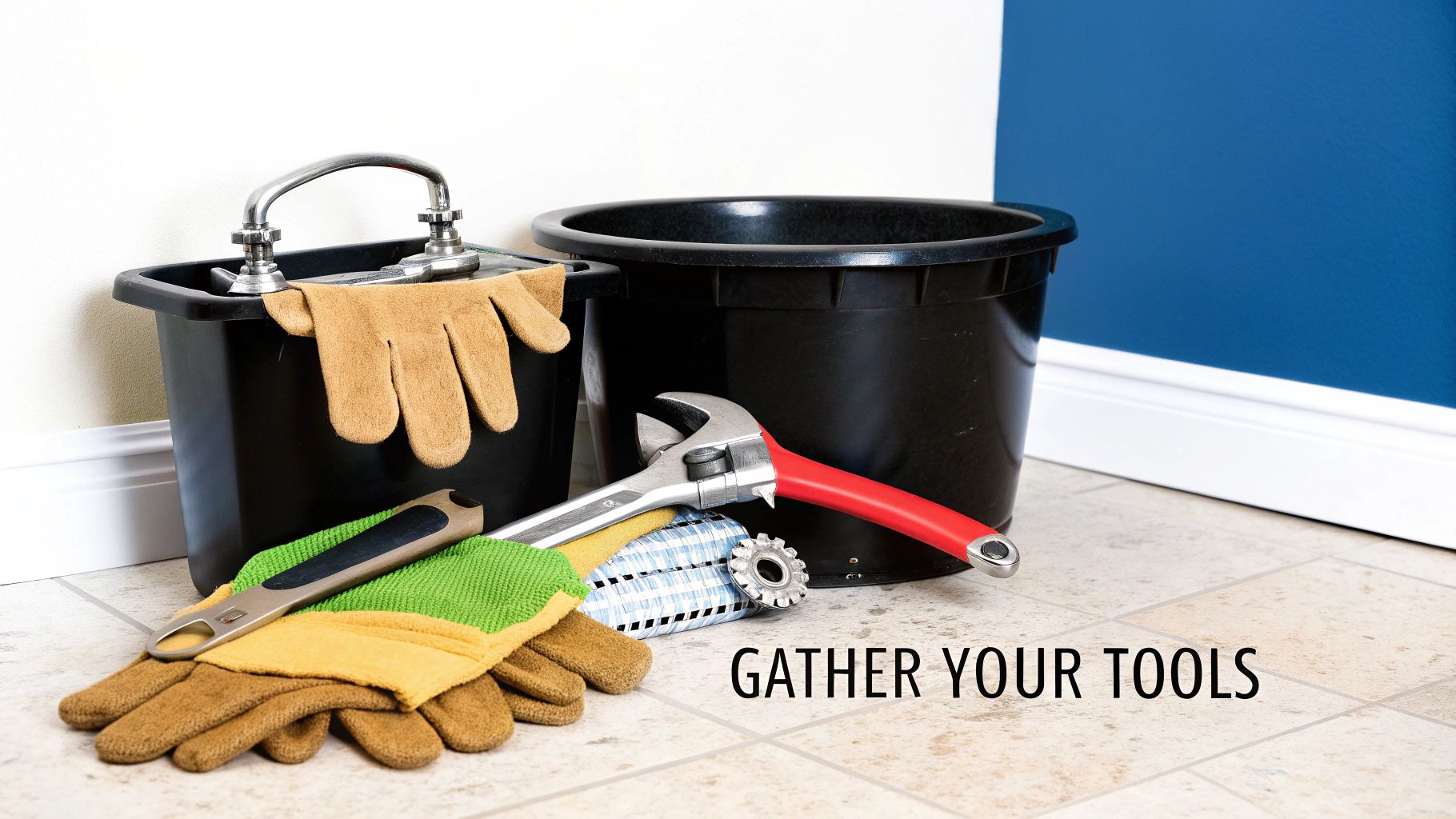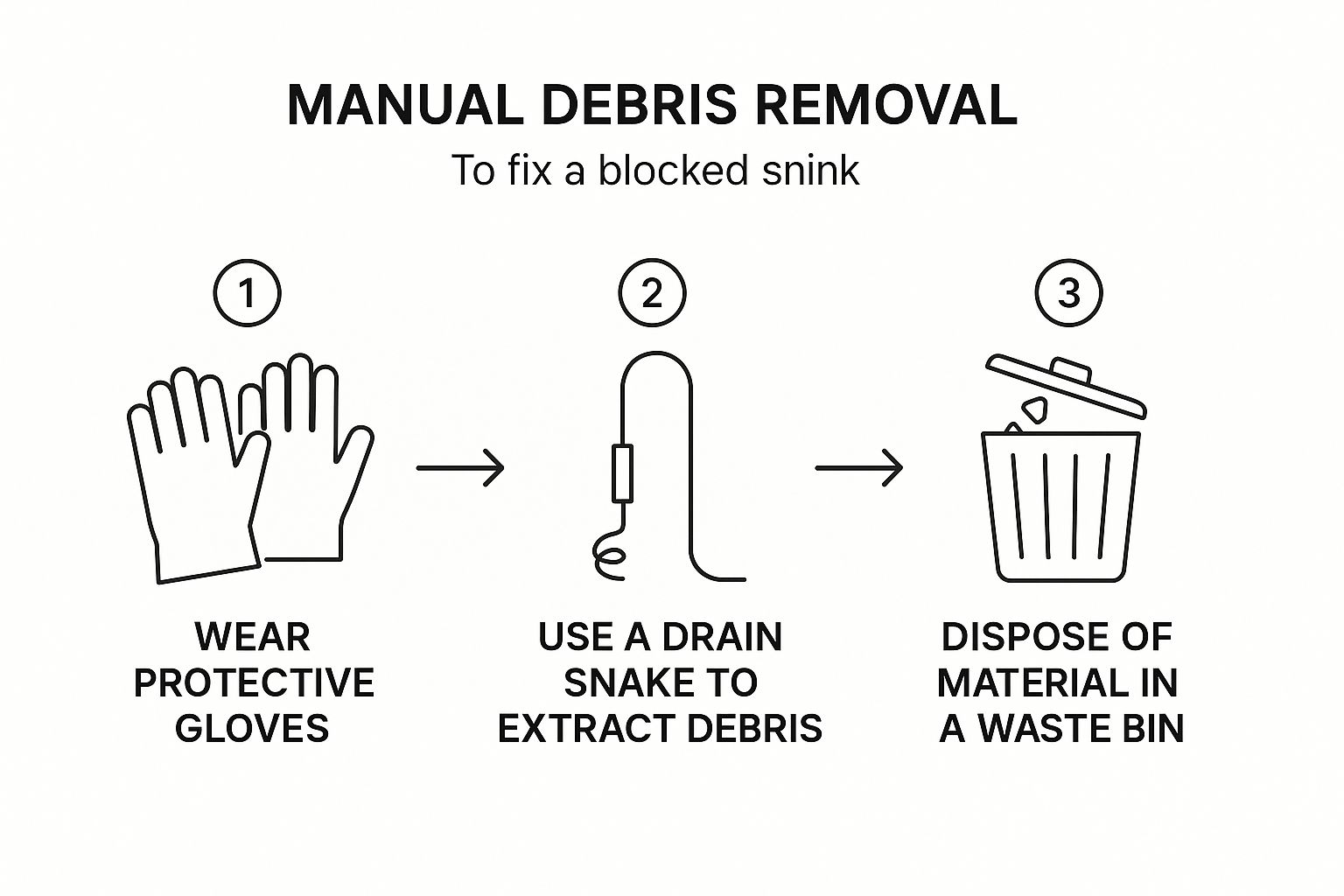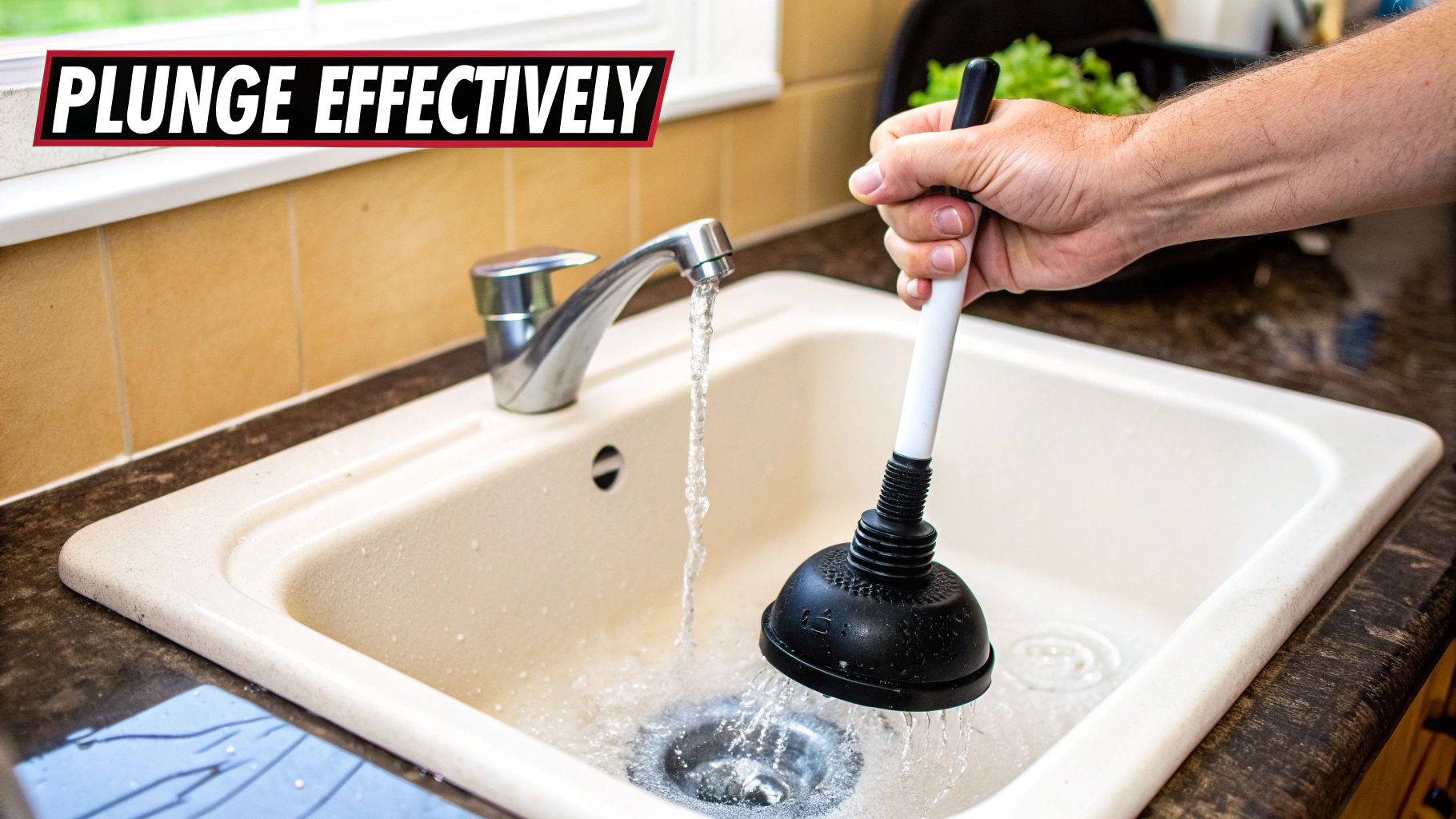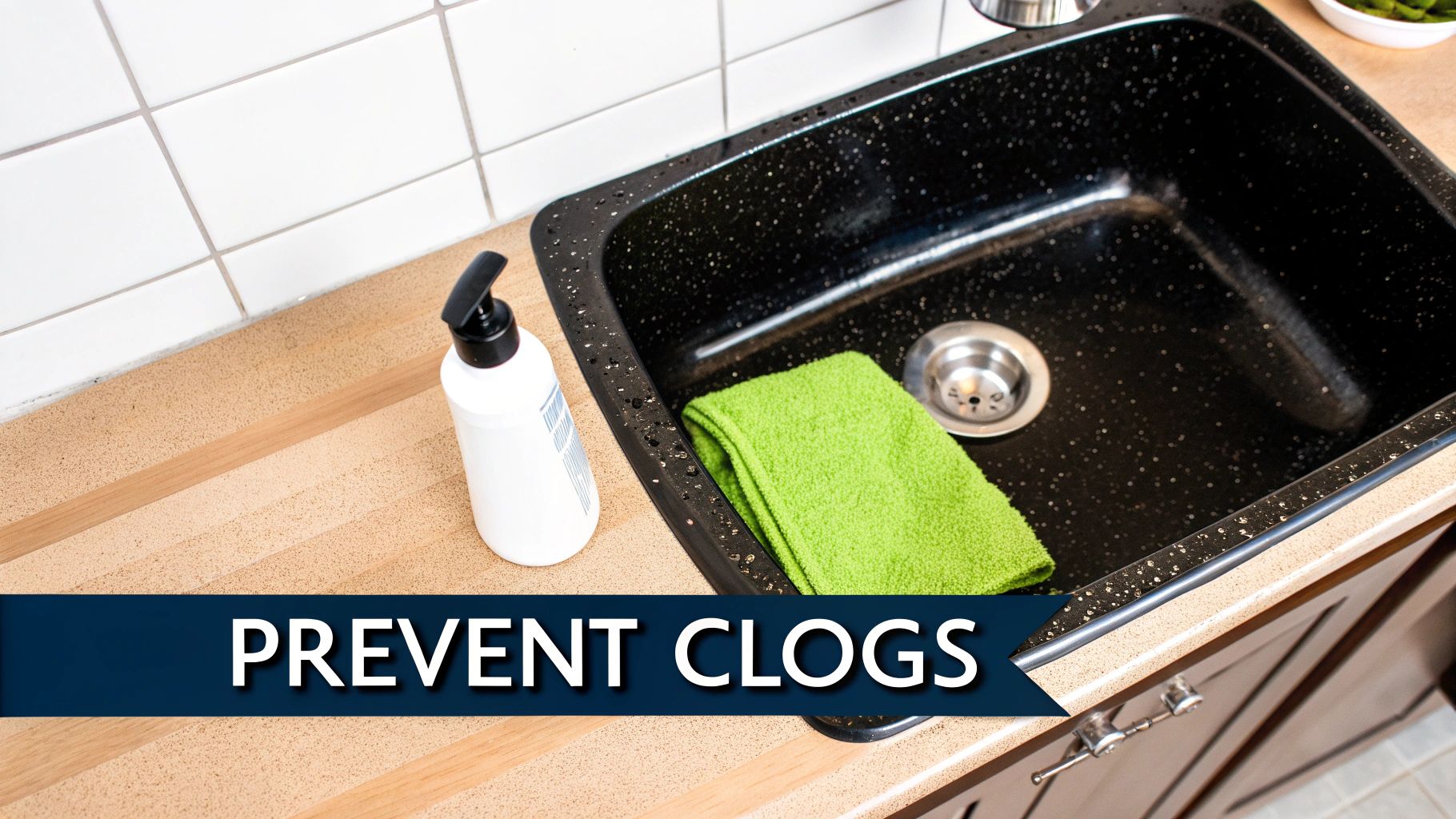How to Fix Blocked Sink: Easy DIY Tips & Tricks
- Luke Yeates
- Sep 9, 2025
- 13 min read
When you spot that tell-tale puddle of water refusing to drain, your first thought is probably a sigh of frustration. That slow-draining sink is more than just an annoyance; it’s often a warning sign of a bigger issue brewing in your pipes. But before you reach for the phone or a bottle of harsh chemicals, there are a few tried-and-tested methods you can tackle yourself with things you likely already have in the cupboard.
In our experience as plumbers across Eastbourne, from the seafront apartments to the homes in Old Town, most sink blockages aren't as dramatic as you'd think. Kitchen sinks are usually the victims of a gradual build-up of fats, oils, and grease from cooking. In the bathroom, it’s almost always a combination of hair and soap scum. The good news? These common culprits can often be dislodged without calling in the professionals from Harrlie Plumbing and Heating.
Simple Home Remedies to Try First
The simplest trick is often the best, and it doesn't get much easier than boiling water. Carefully pour a full kettle of boiling water straight down the plughole. You'd be surprised how often this melts and flushes away a greasy clog. If the water is still draining slowly after the first attempt, give it another go. It costs nothing and is a great first step.
If that doesn't do the trick, it’s time for the classic science-fair volcano method: baking soda and vinegar. Start by pouring about half a cup of baking soda down the drain, followed immediately by the same amount of white vinegar. You’ll hear it fizzing away, which is the reaction working to break down the gunk. Let it sit for at least an hour—longer if you can—before flushing it through with hot water.
We cover a few more DIY tips like this in our guide on how to unblock a drain in Eastbourne with these DIY fixes.
Here's a pro tip from our team: once you've poured the vinegar in, pop the plug over the drain. This traps the fizzing reaction and forces all that bubble-power downwards into the blockage itself, instead of letting it escape up into the sink.
Initial DIY Sink Unblocking Methods
To make it even simpler, here's a quick rundown of the first things you should try. These methods are safe, easy, and surprisingly effective for the most common types of clogs we see.
Method | Best For | Tools Needed | Safety Note |
|---|---|---|---|
Boiling Water | Grease, oil, and fat clogs | Kettle, heat-proof gloves | Pour slowly and directly down the drain to avoid splashes. Not for PVC pipes. |
Baking Soda & Vinegar | Soap scum, hair, and soft organic build-up | Measuring cup, plug | Cover the drain after pouring to direct the fizzing action into the pipe. |
Plunger | Solid, stubborn obstructions | Cup plunger, damp cloth | Ensure a good seal over the drain and block the overflow for maximum pressure. |
These are your first line of defence. If you've tried these and are still having trouble, then it's time to move on to slightly more hands-on approaches.
When to Use a Plunger
If liquids aren't cutting it, the blockage is likely more solid. This is where a good old-fashioned cup plunger becomes your best friend.
For it to work properly, you need to create a solid seal. Make sure there’s enough water in the sink to completely cover the rubber cup of the plunger. Place it firmly over the plughole, and then give it several sharp, vertical pumps. This action sends a powerful blast of water and pressure down the pipe, which is often enough to dislodge whatever is stuck.
Don't forget to block any overflow outlets with a damp cloth first! If you don't, all the pressure you're building will just escape out of the overflow instead of pushing down on the clog. These initial steps resolve a surprising number of blocked sinks we get called about in the Eastbourne area, and they can save you both time and money.
Diagnosing the Cause of Your Blockage

Here at Harrlie Plumbing and Heating, we see the same patterns time and again on our callouts across Eastbourne. The vast majority of kitchen sink troubles are caused by a slow, steady build-up of Fats, Oils, and Grease (FOG). After you’ve done the washing up, this stuff cools down, hardens, and sticks to the inside of your pipes. It’s the perfect sticky trap for bits of food, coffee grounds, and whatever else finds its way down there.
Head into the bathroom, though, and it’s a different story. The usual suspects are tangled clumps of hair and soap scum. The two bind together to create some surprisingly stubborn blockages that a bit of hot water just won't shift.
Identifying Your Sink Blockage Type
So, how do you pinpoint the culprit? It often comes down to location and what’s been happening with that sink recently. Just think about what usually goes down that specific drain.
Kitchen Sinks: If the draining has been getting slower and slower over time, that's a classic sign of FOG build-up. If it suddenly stops completely, a larger piece of food has probably got stuck in the greasy trap you didn't know was there.
Bathroom Sinks: Are you dealing with slow draining accompanied by gurgling noises? You're almost certainly looking at a clog made of hair and soap residue.
Another factor we often deal with in the Eastbourne area is hard water. The chalky ground means our water has high mineral content, which creates limescale inside the pipes. This makes them narrower and gives blockages an even better chance to form.
The key thing to remember is that most blockages don't happen in an instant. They're the result of weeks, or even months, of build-up. By spotting the early signs, you can often step in and prevent a complete standstill.
Of course, sometimes the cause is much simpler: a foreign object. You wouldn't believe some of the things our Harrlie Plumbing and Heating team has been called out to retrieve – everything from bottle caps and small toys to precious jewellery that’s slipped down the plughole by accident.
Common Habits That Lead to Clogs
Getting to grips with common plumbing pitfalls is the best way to prevent future headaches. While people are more aware these days, many households still unknowingly contribute to their own drain problems. A 2019 survey showed that even though most of us know pouring grease down the sink is a bad idea, many still do it, harming their pipes and the wider environment. To see exactly what the UK's drainage habits look like, you can read the complete survey data.
By correctly diagnosing the likely cause—be it grease, hair, limescale, or a lost earring—you can choose the right tool for the job, fix your blocked sink, and stop it from happening all over again.
Tackling Tough Clogs with Advanced DIY Tools
When boiling water and your fizzy bicarb mix don't make a dent, it’s time to admit the blockage is a bit more stubborn. This usually means the clog is either more solid or has lodged itself further down the pipework than those simple solutions can reach. But don't start dialling for a plumber just yet. With a couple of specific tools and a bit of patience, you can often solve the problem yourself.
Your first port of call should be the P-trap. This is that U-shaped pipe directly beneath your sink. It's designed to hold a small amount of water to block sewer gases from wafting up your drain, but it’s also the number one spot for heavy debris, lost jewellery, and thick gunk to build up.
Inspecting the P-Trap
Before you start unscrewing anything, a little preparation goes a long way. Stick a bucket or a washing-up bowl directly under the P-trap to catch the water and whatever else is lurking in there. Trust me, you’ll be glad you did. You’ll also want a pair of rubber gloves for this part.
Using your hands or a pair of pipe grips, carefully loosen the two slip nuts that connect the U-bend to the rest of the pipework. Once they’re loose, the P-trap should come away easily. Empty its contents into the bucket and give the pipe a thorough clean with an old brush and some hot, soapy water. More often than not, this simple clean-out is all that’s needed to fix your blocked sink. We've seen everything from lost wedding rings to compacted tealeaves causing chaos in Eastbourne P-traps!
Once the P-trap is clean and reassembled, run the hot tap for a minute or so. If the water flows freely, congratulations – you’ve solved it. If it still backs up, the blockage is hiding further down the line.
Using a Plumber's Snake
If the P-trap was clear, the culprit is hiding deeper in the waste pipe. This is where a plumber’s snake, sometimes called a drain auger, becomes your best friend. This flexible, coiled wire is designed to navigate the twists and turns of your plumbing to get right to those distant clogs.
With the P-trap still removed, you have direct access to the waste pipe that leads into the wall. Gently feed the end of the snake into this pipe until you feel some resistance—that’s your blockage.

The image above outlines the basic manual steps for using a tool like a drain snake safely. It’s a good reminder about the importance of wearing gloves and getting rid of the retrieved gunk properly.
Once you’ve hit the clog, tighten the setscrew on the snake’s handle and begin to turn it clockwise. This rotating action does one of two things: it either breaks the clog up so it can be flushed away, or it hooks onto the debris (especially good for stubborn hair clogs) so you can pull it back out. You might need to push and pull the snake a few times to get it all. This method requires a bit of elbow grease, but it’s incredibly effective. Here at Harrlie Plumbing and Heating, we often recommend this as the final DIY step before considering a professional call-out.
Using Chemical Drain Cleaners Safely

When you're staring at a sink full of murky, stagnant water, the promise of a quick fix from a bottle can be incredibly tempting. Supermarket shelves are packed with powerful chemical drain cleaners, and they’re clearly popular. The global market for these products hit nearly $3 billion in 2023, which tells you just how often people reach for them. If you're curious about the numbers, you can read more about the sink and drain unblocker market.
But here’s the thing. While these chemicals can sometimes do the job, they come with significant risks that we at Harrlie Plumbing and Heating always urge caution against. Caustic cleaners work by creating a powerful chemical reaction to dissolve a clog, but that same reaction can also wreak havoc on your plumbing, especially if you have older pipework.
Understanding the Risks
This is a real concern for us here in Eastbourne, where so many beautiful period properties have original or older pipe systems that are far more vulnerable to corrosion. A harsh chemical cleaner can easily weaken joints or, in a worst-case scenario, eat right through the pipe. Suddenly, your simple blocked sink has escalated into a much more serious leak.
And it’s not just your pipes that are at risk—these chemicals pose a direct threat to your safety.
Protective Gear is a Must: Always, always wear thick rubber gloves and proper eye protection. A single splash can cause severe burns to your skin and eyes.
Ventilation is Key: The fumes from these products are no joke. Make sure the room is well-ventilated by opening windows and doors before you even think about unscrewing the cap.
Never Mix Chemicals: This is a golden rule. Combining different drain cleaners or mixing them with other cleaning products can create a chemical reaction that releases dangerous, toxic gases.
One of the biggest mistakes we see on call-outs in Eastbourne is people pouring chemicals into a completely blocked sink. If the liquid has nowhere to go, it just sits there in your basin—a hazardous pool of corrosive material right on top of the clog. This makes any follow-up attempt to clear the drain manually extremely dangerous.
A Safer Alternative
If you feel you have to use a liquid solution, we strongly recommend going for an enzyme-based cleaner instead. These products use natural bacteria and enzymes to gently break down organic waste like grease, soap scum, and hair.
They work much more slowly than their aggressive chemical cousins—you'll often need to leave them overnight—but they are significantly kinder to your pipes and the environment. While they might not blast through a major blockage in minutes, they’re an excellent choice for sorting out slow-running drains and for regular maintenance.
For anything more severe, trying to remove the blockage manually with a snake is a far safer and more effective DIY approach before giving a professional a call.
When to Call a Professional Plumber in Eastbourne
You’ve tried the boiling water, had a go with the plunger, and even wrestled with the P-trap, but the sink is still stubbornly refusing to drain. While DIY methods are fantastic for sorting out minor clogs, knowing when to put the tools down and pick up the phone is the key to preventing a small nuisance from spiralling into a major, costly disaster.
Sometimes, a blocked sink isn't just a simple blockage; it’s a symptom of a much more serious problem lurking deeper within your drainage system. If you've managed to clear a clog only for it to come back a week or two later, that’s a massive red flag. Persistent blockages almost always suggest the real issue is much further down the line than any DIY tool can effectively reach.
Telltale Signs of a Deeper Problem
There are a few distinct warning signs that scream it's time to call in the professionals. Don’t ignore these, as they often point directly to a significant blockage in your main drain line.
Recurring Clogs: You fix it, but it keeps coming back. This means you’re only clearing part of a much larger obstruction.
Multiple Fixtures Backing Up: Is your kitchen sink blocked at the same time your toilet is struggling to flush? This is a classic sign of a main sewer line issue.
Gurgling Sounds: When you run the tap, do you hear strange gurgling noises from the plughole or other nearby drains? That sound is trapped air being forced through a partial blockage.
Persistent Foul Odours: If a nasty smell lingers long after you’ve cleaned the sink and P-trap, it’s likely caused by decomposing waste trapped deep inside your pipes.
For homeowners across Eastbourne and the surrounding areas, these symptoms are a clear signal to get a professional on the phone. At Harrlie Plumbing and Heating, we have the specialist equipment needed to properly diagnose and resolve these complex issues for good.
The Professional Advantage
Calling a local expert means you get access to advanced diagnostic tools that simply aren't available for DIY use. We can use a CCTV drain camera to get a real-time view inside your pipes, pinpointing the exact location and cause of the blockage without any guesswork.
A common issue we find in East Sussex, particularly in areas like Meads with lots of mature trees, is root ingress. Tree roots can force their way into older pipework, and no amount of plunging will fix that; it requires specialist equipment to cut them away and repair the pipe.
Once we know what we're dealing with, we can bring in tools like high-pressure water jetters to blast away years of accumulated grease, scale, and debris, leaving your pipes completely clear. This method is far more effective than a traditional plumber's snake and helps prevent future clogs from forming.
It's a common problem – in the UK, it's estimated that over 53% of homes have faced a blocked drain that required professional help. Making that call is the safest and most effective solution if you're unsure or the problem seems bigger than you can handle.
To help you choose the right person for the job, have a look at our guide on finding a plumber in Eastbourne.
Common Questions About Fixing and Preventing Blocked Sinks

Even with the best advice, specific questions always pop up when you're staring down a frustrating blockage. Here at Harrlie Plumbing and Heating, we've pretty much heard them all from homeowners across Eastbourne. Below are answers to the queries that land in our inbox most often, with some practical advice to keep your pipes flowing freely.
Can I Use a Chemical Cleaner on a Completely Blocked Sink?
We strongly advise against this. When a sink is completely backed up and not draining an inch, that chemical cleaner has nowhere to go. It just sits on top of the clog, unable to get through and do its job.
This creates two massive problems. First, you now have a basin full of corrosive, hazardous liquid that can damage the surface of your sink or worktops. Second, it makes the situation extremely dangerous for anyone—including one of our plumbers from Harrlie Plumbing and Heating—who needs to manually clear the drain later. It's always safer to try a plunger or a plumber's snake first on a complete blockage.
How Can I Prevent My Kitchen Sink from Blocking Again?
Prevention is absolutely the best strategy here. The number one rule is to never pour fats, oil, or grease down the drain. After cooking, get into the habit of wiping pans with a paper towel and putting the grease in your food waste or general bin.
Using a simple sink strainer is also incredibly effective for catching food particles before they ever enter your pipes. We also recommend a weekly flush with a full kettle of boiling water. This simple habit helps dissolve any grease that's started to build up and has saved countless Eastbourne clients from repeat call-outs.
A common mistake is thinking a waste disposal unit can handle anything. Even with a disposal, large quantities of fibrous vegetables or starchy foods like potato peelings can still cause significant clogs. Be mindful of what goes down there.
What Is the Best Way to Deal with Hair in My Bathroom Sink?
Hair clogs are notoriously stubborn because they form a net that catches soap scum and other gunk. The single most effective preventative tool is a hair catcher that fits over your plughole; it's a tiny investment for a huge payoff.
For a clog that’s already formed, a small, flexible plumber's snake is perfect for hooking onto the tangled mass and pulling it out. Another great maintenance habit is to periodically remove and clean out the P-trap under the sink, as this is where hair often collects before it can travel further down the pipe.
If you're dealing with other common bathroom issues, you might find our guide on how to fix a leaking tap in Eastbourne helpful too.
Are So-Called Flushable Wipes Really Safe for Drains?
Absolutely not. This is one of the biggest causes of the major blockages we're called out to fix across East Sussex. Despite what the packaging says, "flushable" wipes do not break down in water the way toilet paper does.
Instead, they clump together and mix with grease and other waste to create enormous, stubborn blockages known as 'fatbergs' in the main sewer lines. Remember, only the '3 Ps'—pee, poo, and paper—should ever be flushed. Everything else, including all types of wipes, belongs in the bin.
If you've tried everything and are still struggling with a stubborn blocked sink, don't let it turn into a bigger, messier problem. The team at Harrlie Plumbing and Heating is ready to help residents across Eastbourne and the surrounding areas. Visit us at https://www.harrlieplumbing.co.uk to book a fast, reliable service.

Comments